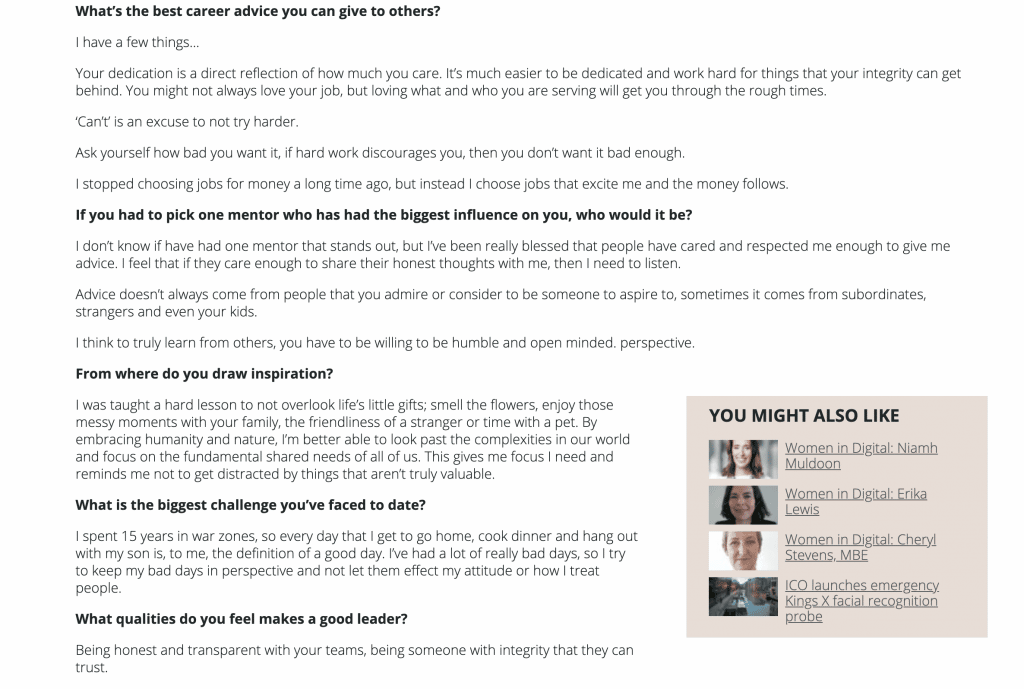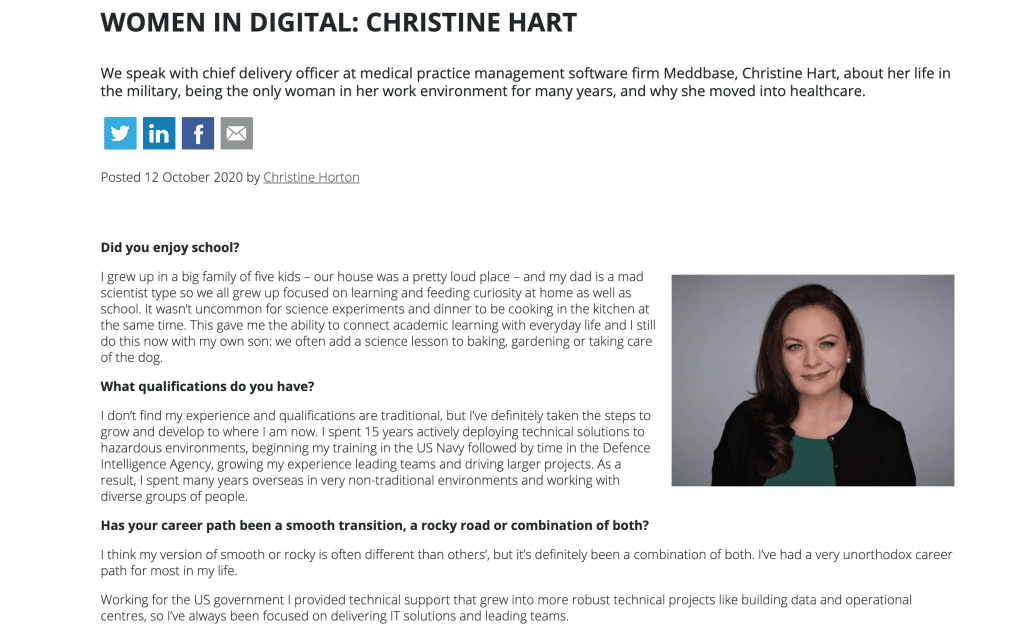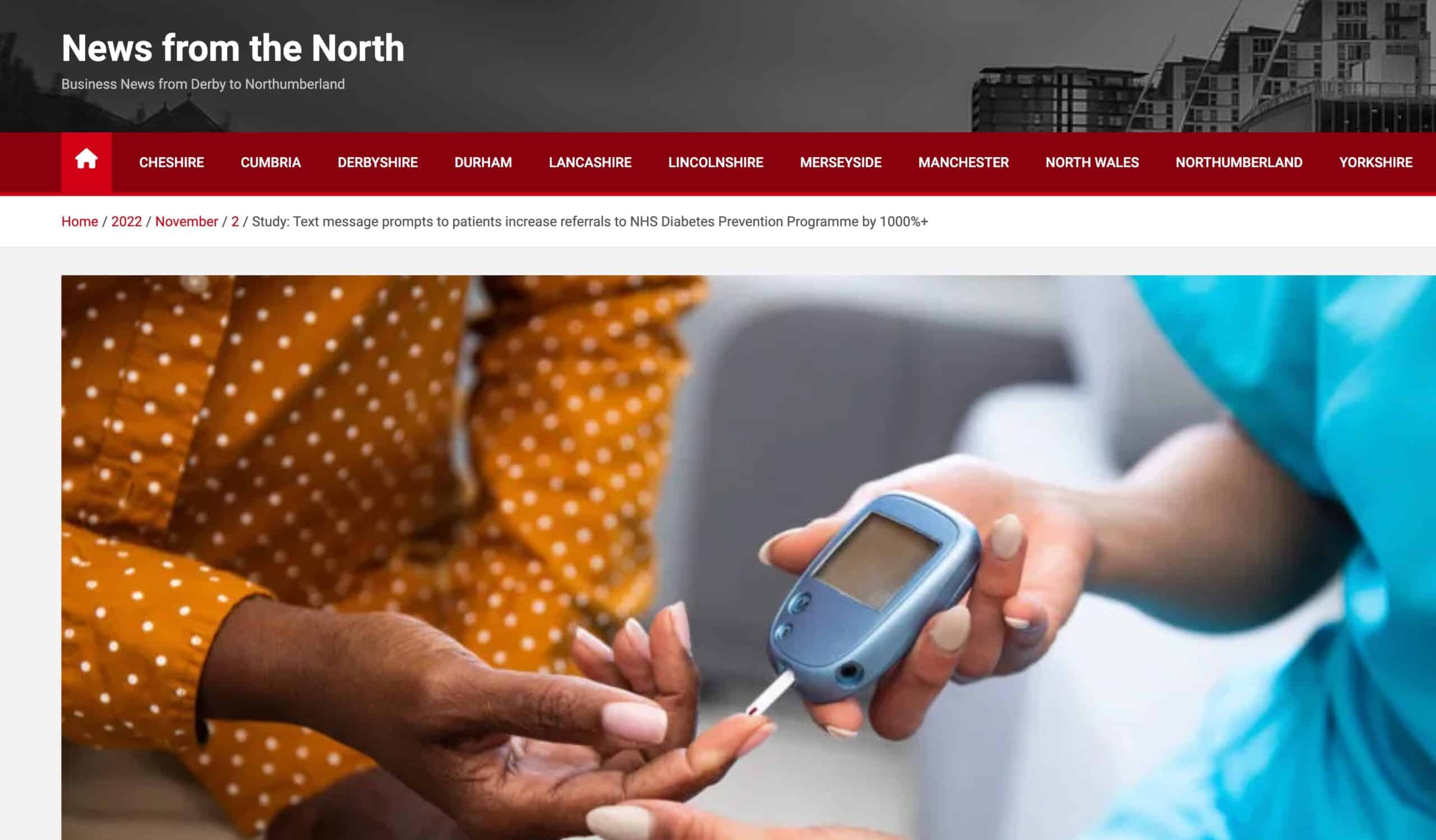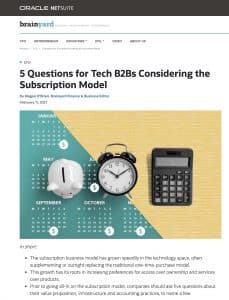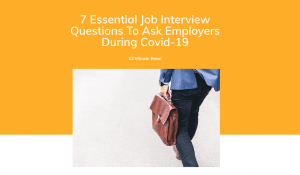Meddbase’s CDO Christine Hart is profiled by Think Digital Partners as part of a series focusing on the career progression of leading women in technology.
WOMEN IN DIGITAL: CHRISTINE HART
We speak with chief delivery officer at medical practice management software firm Meddbase, Christine Hart, about her life in the military, being the only woman in her work environment for many years, and why she moved into healthcare.
Did you enjoy school?
I grew up in a big family of five kids – our house was a pretty loud place – and my dad is a mad scientist type so we all grew up focused on learning and feeding curiosity at home as well as school. It wasn’t uncommon for science experiments and dinner to be cooking in the kitchen at the same time. This gave me the ability to connect academic learning with everyday life and I still do this now with my own son: we often add a science lesson to baking, gardening or taking care of the dog.
What qualifications do you have?
I don’t find my experience and qualifications are traditional, but I’ve definitely taken the steps to grow and develop to where I am now. I spent 15 years actively deploying technical solutions to hazardous environments, beginning my training in the US Navy followed by time in the Defence Intelligence Agency, growing my experience leading teams and driving larger projects. As a result, I spent many years overseas in very non-traditional environments and working with diverse groups of people.
Has your career path been a smooth transition, a rocky road or combination of both?
I think my version of smooth or rocky is often different than others’, but it’s definitely been a combination of both. I’ve had a very unorthodox career path for most in my life.
Working for the US government I provided technical support that grew into more robust technical projects like building data and operational centres, so I’ve always been focused on delivering IT solutions and leading teams.
The work placed me in some very dynamic environments, but also gave me a global view of politics, and a better understanding of world issues and the impact on humans from these strategic decisions. The advantage for my roles in healthcare has been the ability to keep in mind how decisions can impact clinicians and patients.
I’ve never been one to back down from a challenge or hard work, I always look at my career and am thankful for the opportunities that have been provided. Of course, there are periods of time that were so exhausting that I look back on them and immediately want to take a nap, but I also know that those are the times where I overcame the most.
I spent over half of my career the only female engineer, or the only female full stop, and often delivering to very male dominated groups. There were definitely hard days, but I found that if you are willing to fulfil your role, work hard and be part of the solution, not the problem, then respect will be earned, and respect is key.
I never expected to fall into healthcare, but after working for the military, the connection to humanity is similar and the missions are very alike. I need that connection with helping the greater good with a direct, positive impact on people, especially the most vulnerable – our patients. That is who I believe those in the healthcare industry truly serve.
I think that we all have hurdles and as a woman, we often have different challenges that don’t translate onto our CVs, but I also know that I wouldn’t be the leader and mother and person that I am without them. If it took a few rocky roads to get me to who I am today, then I’m good with that and embrace it, scars and all.
What’s the best career advice you can give to others?
I have a few things…
Your dedication is a direct reflection of how much you care. It’s much easier to be dedicated and work hard for things that your integrity can get behind. You might not always love your job, but loving what and who you are serving will get you through the rough times.
‘Can’t’ is an excuse to not try harder.
Ask yourself how bad you want it, if hard work discourages you, then you don’t want it bad enough.
I stopped choosing jobs for money a long time ago, but instead I choose jobs that excite me and the money follows.
If you had to pick one mentor who has had the biggest influence on you, who would it be?
I don’t know if have had one mentor that stands out, but I’ve been really blessed that people have cared and respected me enough to give me advice. I feel that if they care enough to share their honest thoughts with me, then I need to listen.
Advice doesn’t always come from people that you admire or consider to be someone to aspire to, sometimes it comes from subordinates, strangers and even your kids.
I think to truly learn from others, you have to be willing to be humble and open minded. perspective.
From where do you draw inspiration?
I was taught a hard lesson to not overlook life’s little gifts; smell the flowers, enjoy those messy moments with your family, the friendliness of a stranger or time with a pet. By embracing humanity and nature, I’m better able to look past the complexities in our world and focus on the fundamental shared needs of all of us. This gives me focus I need and reminds me not to get distracted by things that aren’t truly valuable.
What is the biggest challenge you’ve faced to date?
I spent 15 years in war zones, so every day that I get to go home, cook dinner and hang out with my son is, to me, the definition of a good day. I’ve had a lot of really bad days, so I try to keep my bad days in perspective and not let them effect my attitude or how I treat people.
What qualities do you feel makes a good leader?
Being honest and transparent with your teams, being someone with integrity that they can trust.
Embrace your humanity, teach that failure is real and we use it to improve.
Set high expectations, tell people that you have faith in them to meet those expectations and teach them how to do so.
Don’t be a good leader on only good days.
A good leader is a good follower, don’t let your role step on others’ voices or their authority to make decisions.
My last thought is to laugh with your teams; you don’t have to be a comedian, but a bit of levity allows them to know that you’re approachable and not always in ‘boss’ mode.
From a work viewpoint what has 2020 been like for you so far?
Exhausting! Healthcare has made a dynamic shift in focus and delivery within a very short time.
Throughout that time of transformation there hasn’t been a way to segregate our family lives from our work lives. As a single mom with a child at home all day, managing online schooling and intensely working through such a stressful time has been exhausting, but I also know that the outcome and improvement in clinical and patient care will change how the world views IT healthcare.
Give us a fact about you that most other people wouldn’t know
I don’t find that these are things that really come up in conversation but…
I’ve been to Formula One and Nascar racing school, and I also went to hand to hand combat and defensive driving school for one of my jobs.
I was the engineer manning the systems for the first ever Iraqi and US Cabinet meetings that George Bush attended in his surprise visit to Baghdad in 2005.
I once bribed a tour bus driver to drive me (and my team) from Athens, Greece to Skopje, Macedonia, the day after the US announced it was at war with Kosovo. His key concern was that he didn’t have Macedonian currency for the tolls… but I did.
I was one of the technical advisors to the current US Embassy in Baghdad while it was being built.
I provided technical support to nine different locations in Afghanistan for a year; six of the sites had zero females allowed on compound and I didn’t work with another female for 11 years of my career.
I bred, raised, and trained Border Collie dogs as a teenager for money.
My first time on an airplane was to go to US Navy bootcamp in Great Lakes, Illinois at 18 years old.
